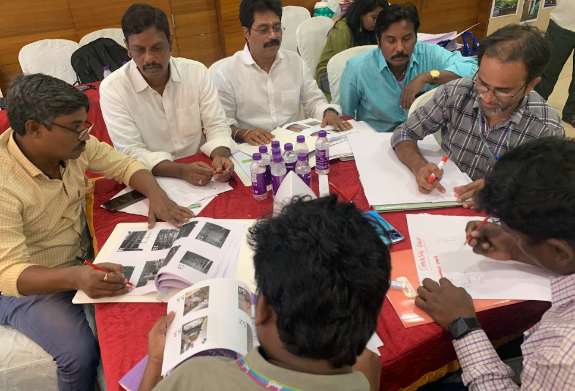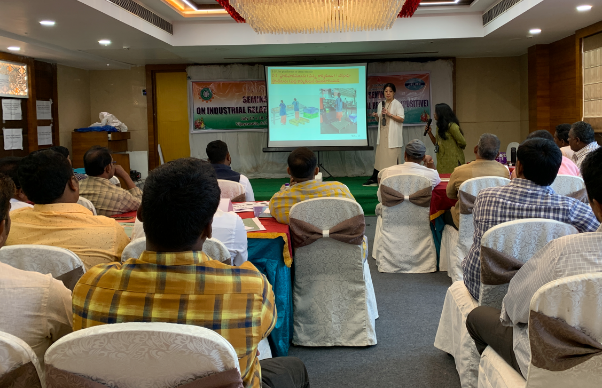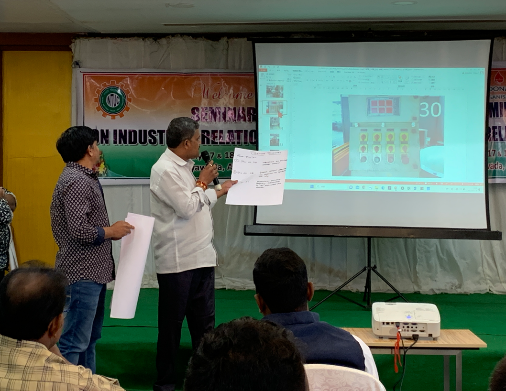INTUC/JILAF Seminars on Industrial Relations in India
The Japan International Labour Foundation (JILAF), together with the Indian National Trade Union Congress (INTUC), held an industrial relations seminar in India’s Vijayawada City in the state of Andhra Pradesh on July 17 and 18. The seminar was attended by thirty-four people, including the leaders of trade unions state-wide.
At the opening, Director Ohno gave his greetings, mentioning the past cooperative relationship between the INTUC and JILAF, and added, “Promoting safety and health initiatives through labor-management cooperation is important work for labor unions. The program is not only about technical matters but also includes group discussions and games, allowing participants to learn about ways to improve their work environment in an interactive manner, and I hope they will gain a lot of insights.”
From the Indian side, Kranthi Kumar, General Secretary of INTUC Andhra Pradesh, stated, “JILAF’s work environment improvement program will not only improve health and safety but will also contribute to increased productivity. I would like to see labor-management dialogue begin at every workplace after taking this seminar.” In addition, on behalf of the management side, labor and management representatives from local ITC Limited (a food manufacturing and sales company) expressed their expectations for the program.
Next, Program Manager Kato introduced JILAF’s activities before outlining the (1) the situation surrounding labor unions in Japan, (2) the history and role of Japan’s labor movement—the path to building constructive labor-management relations and (3) contemporary issues in Japan, all under the title “The History and Role of Japan’s Labor Movement,” prompting participants to ask about Rengo’s organizational structure and the “spring wage offensives.”
Following this, Occupational Safety and Health Expert Miwako Nagasu gave a lecture titled “Participatory Activities to Improve the Workplace Environment.” Specifically, she explained (1) the results of the work environment improvement program in Chennai (improvement photos, analysis of survey results, etc.), (2) the poster-making activity that was carried out with the participation of workers in Jordan, and (3) the activity that the UNIDO (United Nations Industrial Development Organization) implemented for furniture makers in Lebanon. Afterwards, participants underwent training exercises with checklists as they viewed photos posted on the wall of various workplaces along with carrying out group discussions and presentations focused on low-cost best practices.
For each technical area of the program, Occupational Safety and Health Expert Miwako Nagasu facilitated immersive lectures and related games followed by group discussions and presentations. Regarding the technical area of the “transportation and storage of objects,” they played a game carrying eggs before learning: (1) to ensure safe passage, (2) where and how to safely and efficiently place materials and tools, (3) that transportation and movement should be small, short, and safe, and (4) that heavy objects should be carried as infrequently as possible and done efficiently.
The second day started with the technical area of “workstation change,” and after playing a game with colored pencils, participants were taught how to: (1) place tools and materials close to the worker, (2) work at elbow height, (3) ensure that their hands and feet are protected at all times, and (4) that displays and operation panels are easy to understand.
In the technical area of “improving hazardous work environments,” they learned about (1) using good lighting, (2) protecting workers from the heat and cold, (3) making sure that noise does not impede communication and safety, and (4) protecting workers from particulates, chemicals, and other harmful substances.
In the technical area of “welfare, teamwork, and environmental protection,” after playing a castle game, they deepened their understanding with regard to (1) reconsidering the division of work to ensure better teamwork, (2) improving working hours, including vacations and holidays, as well as managing overtime to prevent overwork, (3) sharing information through bulletin boards and meetings, (4) providing such welfare facilities as toilets and break rooms, and (5) promoting mutual support within the workplace.
Each group formulated a final proposal for management and discussed what workers and unions can do to promote occupational safety and health. At the end, the participants presented three positives as well as suggestions for improvement with General Secretary Kumar acting as the factory manager.
To identify local needs regarding “business and human rights,” they conducted a poll on this topic using post-it notes. They formulated a concrete action plan to address the strong need for the “promotion of decent work,” “legal equality for people with disabilities, women, LGBTQ, and others,” and “human rights associated with the development of such new technologies as AI, the internet, and social media.”
At the closing, General Secretary Kumar encouraged the participants with, “This seminar is also a program to train trainers, so I would like you to hold a one-day workplace seminar at all of your workplaces and provide feedback.” In response, Group Leader Ohno concluded this two-day industrial relations seminar by saying, “I hope that the continuous follow-up and implementation of improvement efforts will lead to better labor-management relations and a reduction in industrial accidents.”



